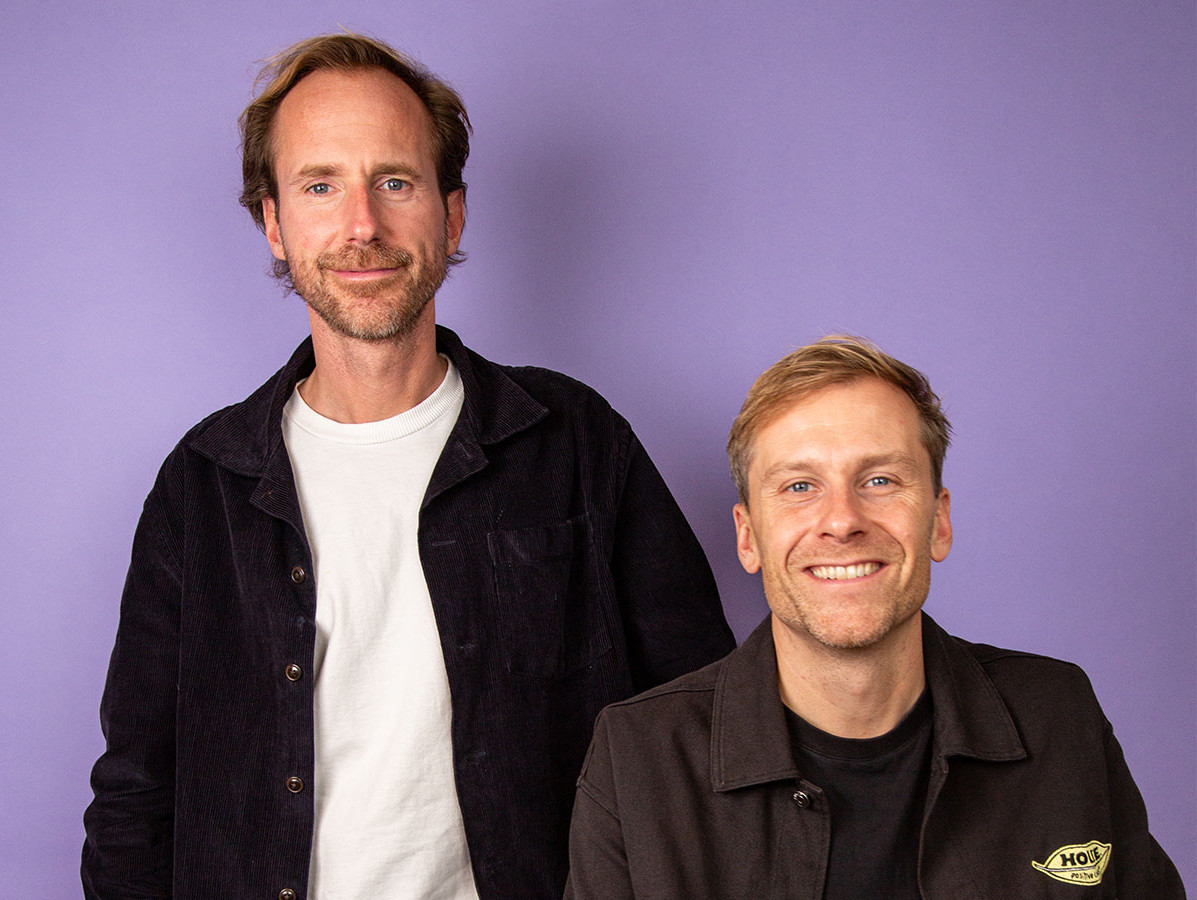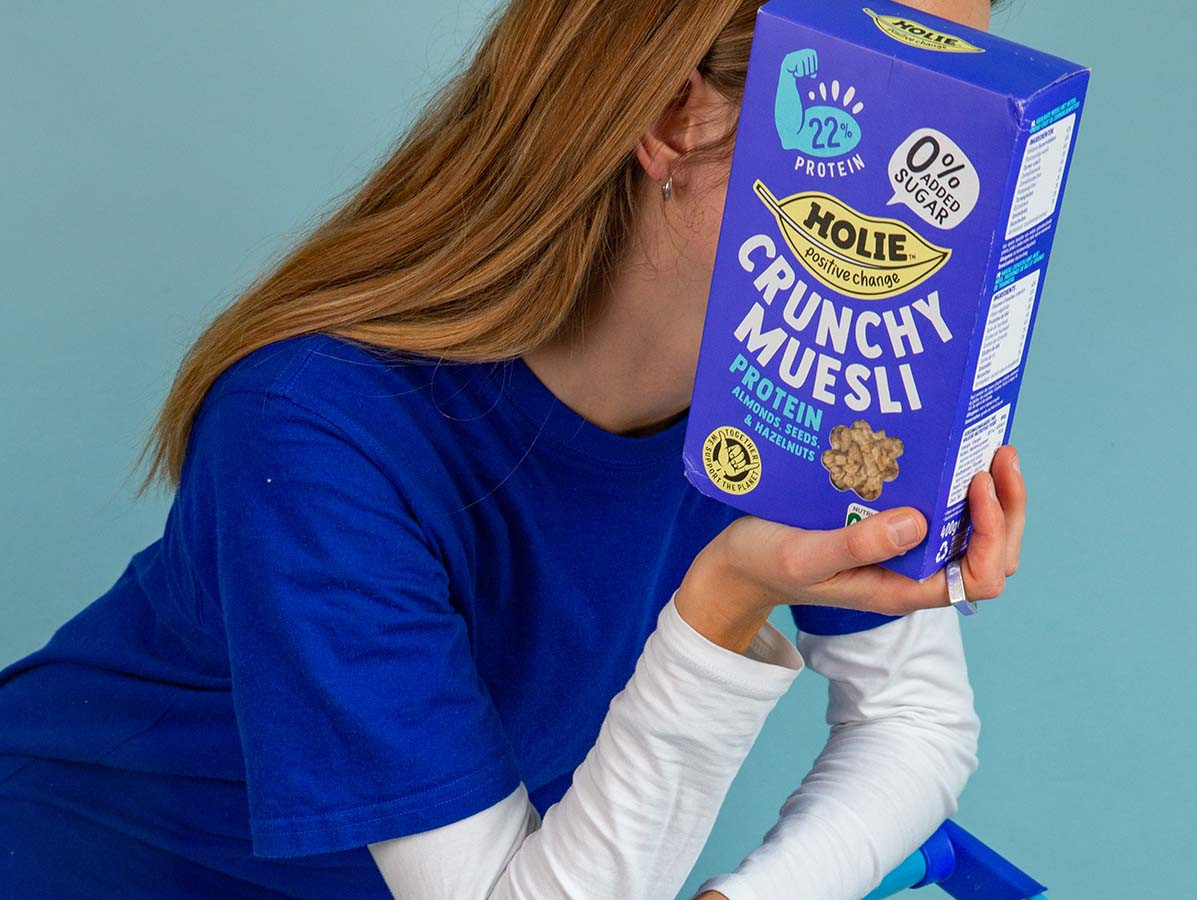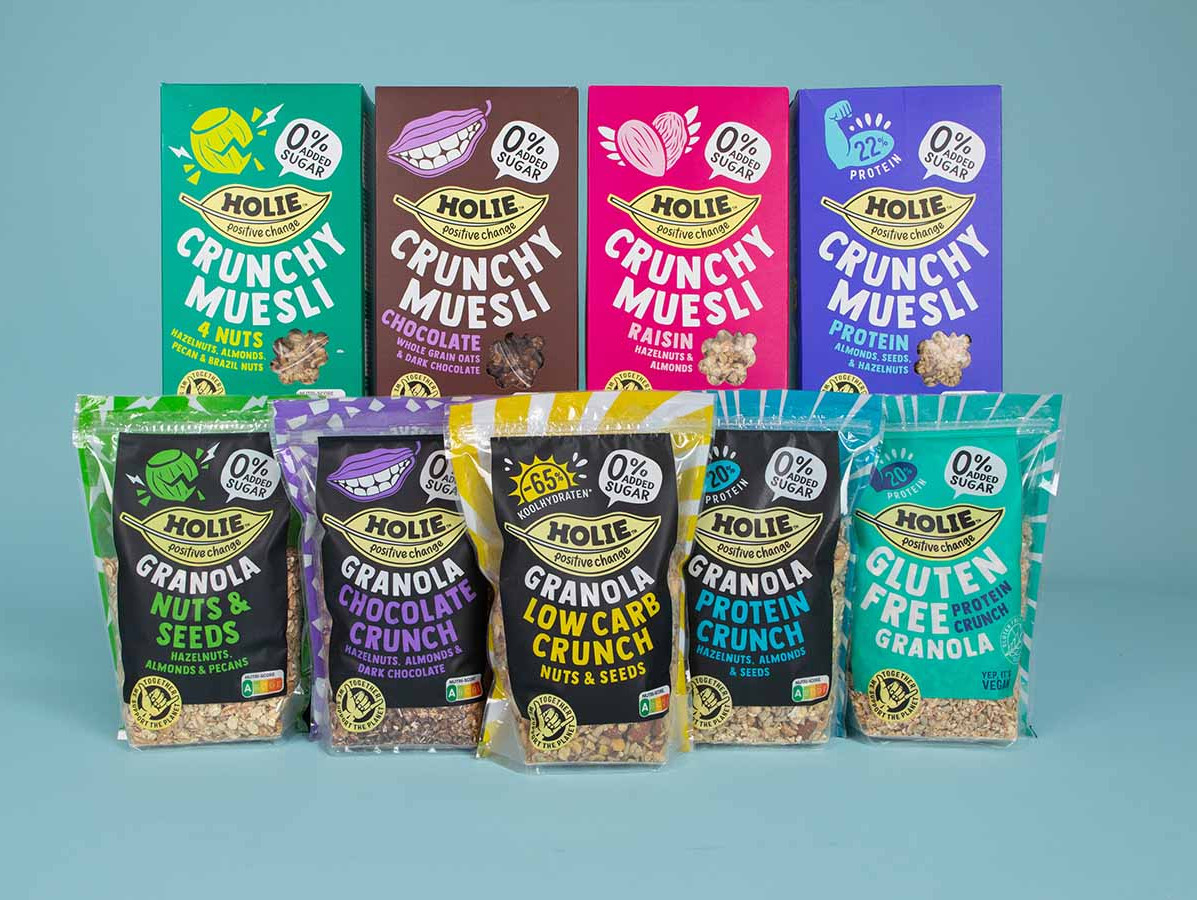
In just over five years, the do-good brand Holie grew from an attic startup to the second-largest breakfast cereal brand in the Netherlands, with a turnover that doubled for the second year in a row, reaching eight million in 2023. How? Through unmatched optimism and... by applying focus!
There they stand in the doorway, two happy faces welcoming Vakblad Voedingsindustrie to their modest yet atmospheric canal house office in Amsterdam. They are Valentijn van Santvoort (big smile) and Merick Schoute (high five), two of the three founders and co-owners of Holie. The third, Marc Veltman, a taste expert and ‘head of R&D’, prefers staying behind the scenes. No problem, because Valentijn and Merick give the brand enough character as a duo.
In just over five years, Holie has developed rapidly. The company recently received the FD Gazelle Award for the second time, recognizing the fastest-growing companies in the Netherlands. In those two years, Holie intensified its fight against hidden sugars in breakfast cereals. "But if the taste isn't top-notch, people won't buy it."
Merick: "We started with hummus and breakfast cereals for children. In 2020, we switched to granola, and that was also the year we started appearing on the shelves of Albert Heijn, a significant step."
Valentijn: "Because we wanted to focus. Look, that mission is still solid. We continue to plant trees in collaboration with Justdiggit and Trees for All in the Netherlands and Africa. We believe that 37 percent of the climate problem can be solved by natural solutions like these, so we continue to donate that one percent of turnover (this year 80 thousand euros, editor’s note). But Holie is also a brand that solves health problems. If you convey too many messages at once, you won't be heard. That's why we choose to focus on de-sugaring the breakfast cereal shelf. That’s what the brand stands for."
Merick: "It was a matter of 'killing your darlings.' Not easy. We were experiencing 40 percent growth, so commercially successful. The step allowed us to fully concentrate on the breakfast segment. This helped us know our competitors better, and business partners understood our position more clearly. We were the challenger with healthy products. It clicked right away. The conversations at Albert Heijn became much easier. No more difficult questions, but 'what's the next flavor?' and other parties began to find us."
"The secret is the crystal-clear positioning: crispy without sugar"

Merick: "For example, we were approached by the National School Breakfast to become their 'breakfast cereal partner.' This is not a title you get easily; it requires a stringent screening process. The last time, on November 6, we provided 500 thousand breakfasts, which gives us different exposure. It adds credibility towards retail, and we're increasingly seen as a thought leader in health. Things like this wouldn't have happened if we'd continued dabbling in hummus."
Valentijn: "Mainly our crystal-clear positioning: crispy without sugar. It has to be simple because the breakfast cereal shelf is full of claim noise. On our packaging, we avoid claims, leaving more room for the product. Also important, we've completely broken with the packaging code of breakfast cereals. No cues of 'artisanal,' no images of ingredients. We stand out due to the strength of our graphic design and the use of colors. Apart from all that; people won't buy it if the taste isn't top-notch. We've spent two full years developing. It's about the perfect crunch, the size of the grain flakes, minimal dust, the freshness of ingredients; that's why people keep buying our products."
"What also plays a role is that we keep telling our story to anyone who will listen," he continues. "We're super active on social media, posting videos and other content whenever we have news. We do this in a playful way. That makes us very happy. But it also keeps us continuously top of mind. Even dietitians and unpaid influencers email us for samples. It certainly helps when professionals recommend our brand. And sure, we also work with paid influencers."
Merick: "Well, to start; we don't rule it out for later. But at this moment, we don't see it that way. It's not 'our cup of tea' to run a factory. That's why we work with a granola factory in the Netherlands and for crispy muesli in Germany."
"It's about different interests," says Merick. "A factory needs to keep its occupancy as high as possible to be successful. It can be tempting to fill open hours with private label products that do add a lot of sugar. We don't support that."
"Do not just ask what consumers are waiting for."

Merick: "We also think about other forms. You can imagine investing in a production line with a production partner, like a kind of share. But fundamentally, we are a marketing and sales organization with our recipes. So far, this has been a powerful approach."
Valentijn: "The environment of breakfast is one of health washing. It's full of claims like 'source of protein' 'fibers', 'natural ingredients', but they're all full of sugar. We wanted to expose this in a fun way: 'The Holie Truth.' We dressed up in angel costumes and were lifted into the air on a cable to convey this message. Hey people! This is how much sugar there is per 100 grams! It was a success; the video was viewed 1.5 million times. And it's significant for us that a dietician from the Diabetes Fund joined in, explaining why too much sugar in the morning isn't good for you. This contributes to support and credibility."
"Not really," says Valentijn. "The reason we did that was to immediately defuse the situation. It's a video with a message, but it should remain fun. That is also appreciated by Pepsico (owner of the 'sweet' breakfast brand Quaker), which wrote us a letter directly. 'Nice that you're doing that, but do you see that we also have a 0 percent added sugar variant?' We wrote back, and that was the end of it."
Valentijn: "We are the second-largest brand after Quaker. You can't achieve that with just Stach and the canal belt. And don't underestimate the masses. They are becoming increasingly critical of what goes into their shopping cart."
Merick: "Especially not by asking what consumers are waiting for. When we started, we just did it. That makes us the only brand that has everything healthy. So dare to choose health without compromises. No shortcuts, a little sweetener, a little honey, no!, find a completely new route, then you'll reach places no one has been before."
Valentijn: "Yeah, and besides, manufacturers could take more responsibility. 80 percent of the supermarket offer is unhealthy. 70 percent of people intend to eat healthier. The solution isn't too complicated, right? And hey, if we can do it from an attic in Amsterdam, you can imagine the difference a company can make…"
Merick: "We want to expand in Belgium, where we are already cautiously active, and we want to enter the British market, which is much larger than the Benelux, truly a 'cereal for breakfast' country. We need a war chest for that. We are convinced that we need to start local teams for this. We already have this experience in Belgium and yes, Brits prefer to do business with Brits."
Valentijn: "It might also be time to do something about our brand awareness. We're allocating part of the raised funds for that."
Merick: "Next spring, five new variants will be added, all without hazelnuts. Partly to create options for people with allergies, but also to make our range more mature. We'll go to 14 SKUs. There's still plenty of work to do. Quaker has 39."
Photos: ©Holie: Valentijn van Santvoort (left) and Merick Schoute
Source: vakblad Voedingsindustrie 2023